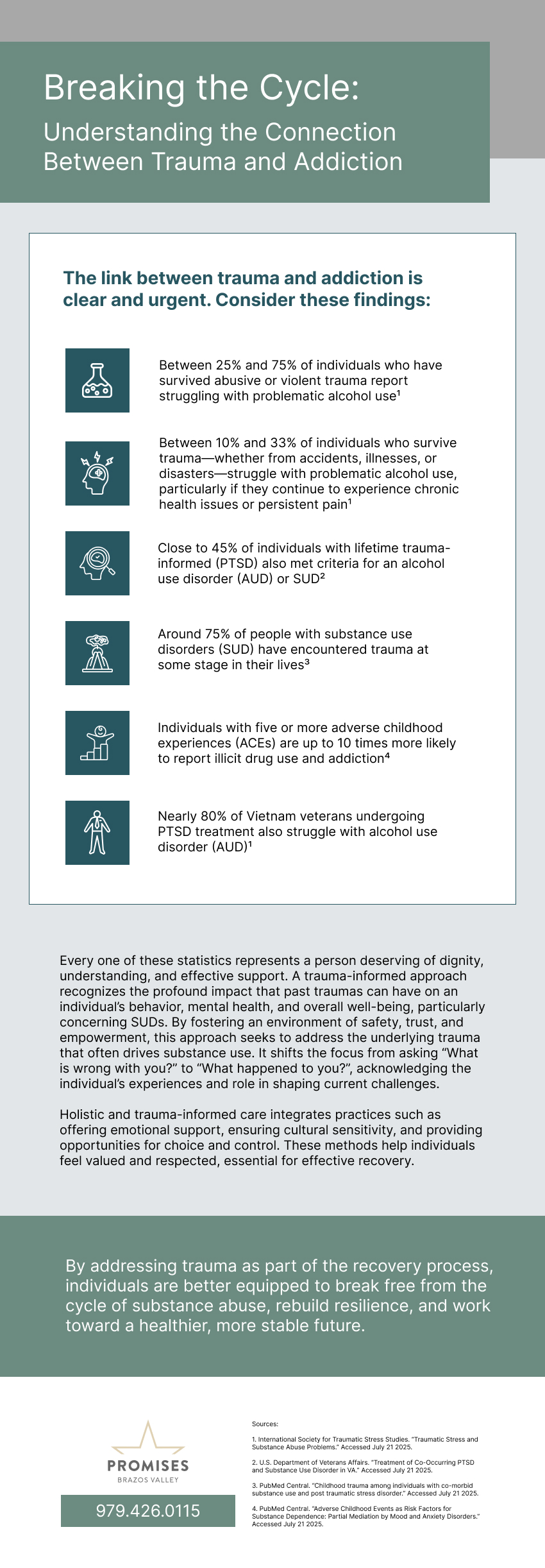When facing substance use challenges, the pain of past experiences can sometimes feel overwhelming, but you are not alone. There’s hope for a brighter future; understanding your body, mind, and spirit needs can be the first step to healing.
For many, recovery means not only addressing substance use, but also examining the underlying causes that make change so hard. That’s why dual diagnosis treatment, which recognizes both addiction and trauma or mental health concerns, is so vital. Learn how trauma shapes addiction, what real trauma looks like, and why compassionate, evidence-based trauma-informed addiction treatment can make all the difference in your recovery journey by contacting our team in College Station, TX, today.
What is trauma?
Trauma is more than a single event—it’s the lasting emotional impact challenging experiences leave behind. The American Psychological Association (APA) defines trauma as a deeply distressing experience that triggers intense fear, helplessness, dissociation, confusion, or other overwhelming emotions. These feelings can be so severe that they negatively impact a person’s attitudes, behavior, and overall ability to function. This definition captures only a fraction of what people truly feel after something life-altering happens. Trauma isn’t just something that happened to you. It’s how your mind and body react, shaping your thoughts, emotions, and daily decisions for years afterward.
For many, trauma’s effects linger in subtle ways—a gentle person who becomes withdrawn, someone who doubts their self-worth, or someone who struggles to trust others. Understanding the root of these changes is key to recovery. Trauma is often mistaken for the event itself, but its true essence lies in the lasting impact—the response it leaves behind. Healing starts by recognizing this distinction.
Take, for example, a woman who, as a child, endured trauma in her bedroom. Even as an adult, she may find herself sleeping on the couch—not because it’s more comfortable, but because old fears linger. She knows logically that she’s safe now, but her emotions tell her otherwise. This disconnect is common and underscores why specialized treatment is so essential. The best care doesn’t just treat symptoms—it sees and supports the whole person.
Types of trauma
Trauma can take many forms, and recognizing what kind of trauma you or your loved one has experienced can help guide the healing process. Experts generally describe three main types:
- Acute trauma: Resulting from a single distressing event, like an accident or assault
- Chronic trauma: Caused by repeated or prolonged exposure to distress, such as ongoing abuse or bullying
- Complex trauma: Involves exposure to multiple traumatic events, often over an extended period, as might happen with sustained abuse or violence
How trauma affects the brain
Your brain is uniquely wired to protect you, but sometimes that protection can keep you stuck after trauma. When you experience something frightening, your brain’s amygdala (the fear center) reacts instantly. But trauma memories are stored even deeper—in areas like the hippocampus and prefrontal cortex—where powerful emotions can shape how you think and feel long after the event is over.
Recent research shows that trauma doesn’t just change thoughts; it can physically alter the brain’s structure. You may notice yourself reacting to harmless situations as if you’re still in danger—that’s your brain doing its best to keep you safe. Recognizing this is empowering. This means that with proper support, these changes can be addressed. By using gentle, evidence-based therapies, your brain can form new, healthier pathways, allowing you to regain a sense of control, safety, and joy.
What is trauma-informed addiction treatment?
It’s important to know that trauma is one of the most frequent catalysts for substance use disorders (SUDs). For many, substances are not the problem—they’re the temporary solution to emotional pain that feels unbearable. However, recovery is possible, especially with approaches explicitly designed for complex histories.
Trauma-informed addiction treatment is an evidence-based approach that recognizes and addresses the profound effects trauma has on both the mind and body. Unlike traditional models, this approach is rooted in understanding, empathy, and a commitment to restoring safety and control. People are never reduced to their diagnoses—every individual’s experiences, needs, and strengths are honored throughout the process.
In trauma-informed care, programs are structured to:
- Create safe, supportive environments
- Empower individuals by giving them choice and agency
- Foster trust between patients and caregivers
- Respect personal boundaries
- Enhance self-worth and instill hope
While trauma itself can leave you feeling powerless, treatment helps you gradually reclaim your life, one step at a time.
Holistic addiction treatment: Treating the whole person
Part of what makes trauma-informed addiction treatment effective is its holistic perspective. Holistic addiction treatment considers your life as a whole—your physical health, emotional well-being, family, relationships, and even your hopes for the future. That means therapies go beyond simply managing symptoms and address the underlying causes, including trauma.
Holistic care might include:
- Trauma-focused therapy, such as eye movement desensitization and reprocessing (EMDR)
- Mindfulness-based stress reduction
- Family and relationship counseling
- Support for co-occurring conditions like anxiety or depression
The goal is to help you build a foundation for lifelong well-being—not just sobriety now, but fulfillment and connection into the future.
People are multi-faceted, and so is recovery. An integrated treatment approach combines multiple evidence-based practices, blending mental health treatment, trauma therapy, and substance abuse support. For those with dual diagnoses or complex life histories, integrated care ensures all needs are treated together—not in isolation.
This approach may involve coordinated case management, cross-trained clinical teams, and a strong focus on communication. Whether you need help with PTSD and addiction, or support in navigating complicated family dynamics, integrated treatment means you’ll never have to face the journey alone.
How can you find proper trauma-informed addiction treatment?
Asking for help is not weakness—it takes courage, and you can take pride in every step forward. When searching for trauma-informed addiction treatment, look for programs that prioritize:
- Safety and comfort from the first phone call
- Comprehensive trauma screening and assessment
- Trauma therapy options
- Clear support for empowerment and personal boundaries
- Commitment to ongoing education and holistic health
At Promises Brazos Valley, we believe recovery is a journey best taken together. As part of the Promises Behavioral Health family, our program is dedicated to trauma-informed care and supporting individuals every step of the way. Our integrated treatment approach includes trauma-specific groups, holistic therapies, and comprehensive support for co-occurring disorders. There is hope, and we’re honored to help you find it.
Frequently asked questions (FAQs) about trauma-informed addiction treatment
What is trauma-informed addiction treatment and how does it differ from traditional methods?
Trauma-informed addiction treatment emphasizes understanding the role of trauma in substance use disorders. Unlike traditional methods that focus mainly on treating the addiction itself, trauma-informed care considers your history and uses empathy, safety, and empowerment as core principles. This approach creates a healing environment where every part of you is respected and supported.
How does trauma-informed care support addiction recovery?
This approach creates trust, safety, and empowerment. By honoring your experiences and boundaries, programs foster self-esteem, encourage participation, and provide opportunities to regain control—giving you the foundation for lasting recovery.
What role does trauma therapy play in holistic addiction treatment?
Trauma therapy addresses underlying pain rather than just symptoms. In a holistic addiction treatment setting, trauma therapy may include counseling, EMDR, or group support, and is integrated with therapies focusing on nutrition, mindfulness, relationships, and more. Treating the whole person helps ensure broad, deep, and sustainable recovery.
How can an integrated treatment approach benefit those with PTSD and addiction?
For people facing both PTSD and a substance use disorder, an integrated treatment approach offers coordinated, comprehensive care. You receive mental health support, addiction counseling, and trauma therapy all within a single plan—helping avoid gaps and ensuring every part of your well-being is addressed, together.
What are the key components of trauma recovery programs for substance abuse treatment?
Trauma recovery programs often include trauma screenings, evidence-based therapies, holistic health support, peer groups, relapse prevention, and aftercare. The emphasis is always on creating safety, empowerment, and personal growth in a compassionate, judgment-free setting.
Connect with Promises Brazos Valley and get started on trauma-informed addiction treatment
You deserve hope, healing, and a life free from the shadows of trauma and addiction. The path may feel daunting at times, but compassionate, trauma-informed addiction treatment makes recovery possible. At Promises Brazos Valley, your story is honored and your journey is supported with respect, warmth, and the utmost care.
If you or a loved one is struggling with substance abuse and the weight of trauma, reach out to our team online or call 888.483.7851 today. With the proper support and understanding, a future filled with safety, trust, and joy isn’t just possible—it’s within reach.


